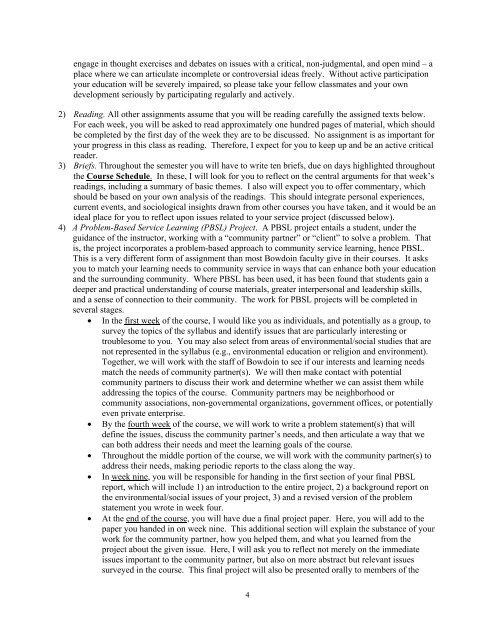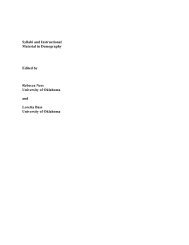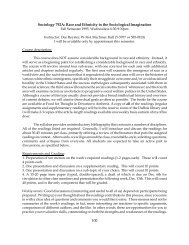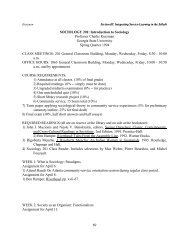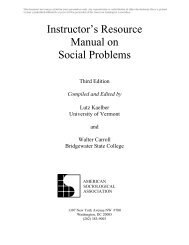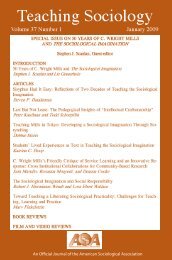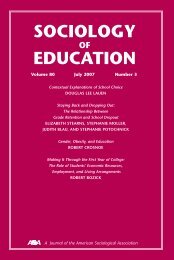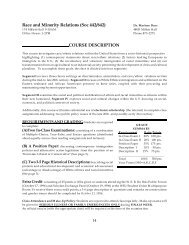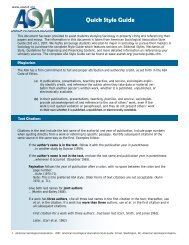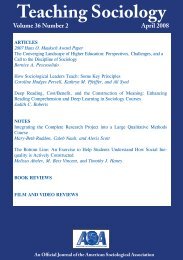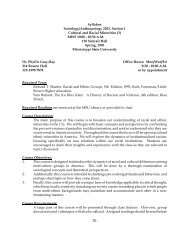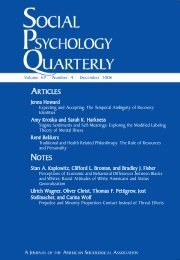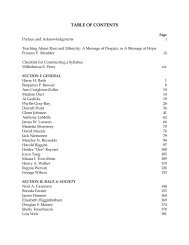Environmental Sociology - American Sociological Association
Environmental Sociology - American Sociological Association
Environmental Sociology - American Sociological Association
Create successful ePaper yourself
Turn your PDF publications into a flip-book with our unique Google optimized e-Paper software.
engage in thought exercises and debates on issues with a critical, non-judgmental, and open mind – a<br />
place where we can articulate incomplete or controversial ideas freely. Without active participation<br />
your education will be severely impaired, so please take your fellow classmates and your own<br />
development seriously by participating regularly and actively.<br />
2) Reading. All other assignments assume that you will be reading carefully the assigned texts below.<br />
For each week, you will be asked to read approximately one hundred pages of material, which should<br />
be completed by the first day of the week they are to be discussed. No assignment is as important for<br />
your progress in this class as reading. Therefore, I expect for you to keep up and be an active critical<br />
reader.<br />
3) Briefs. Throughout the semester you will have to write ten briefs, due on days highlighted throughout<br />
the Course Schedule. In these, I will look for you to reflect on the central arguments for that week’s<br />
readings, including a summary of basic themes. I also will expect you to offer commentary, which<br />
should be based on your own analysis of the readings. This should integrate personal experiences,<br />
current events, and sociological insights drawn from other courses you have taken, and it would be an<br />
ideal place for you to reflect upon issues related to your service project (discussed below).<br />
4) A Problem-Based Service Learning (PBSL) Project. A PBSL project entails a student, under the<br />
guidance of the instructor, working with a “community partner” or “client” to solve a problem. That<br />
is, the project incorporates a problem-based approach to community service learning, hence PBSL.<br />
This is a very different form of assignment than most Bowdoin faculty give in their courses. It asks<br />
you to match your learning needs to community service in ways that can enhance both your education<br />
and the surrounding community. Where PBSL has been used, it has been found that students gain a<br />
deeper and practical understanding of course materials, greater interpersonal and leadership skills,<br />
and a sense of connection to their community. The work for PBSL projects will be completed in<br />
several stages.<br />
• In the first week of the course, I would like you as individuals, and potentially as a group, to<br />
survey the topics of the syllabus and identify issues that are particularly interesting or<br />
troublesome to you. You may also select from areas of environmental/social studies that are<br />
not represented in the syllabus (e.g., environmental education or religion and environment).<br />
Together, we will work with the staff of Bowdoin to see if our interests and learning needs<br />
match the needs of community partner(s). We will then make contact with potential<br />
community partners to discuss their work and determine whether we can assist them while<br />
addressing the topics of the course. Community partners may be neighborhood or<br />
community associations, non-governmental organizations, government offices, or potentially<br />
even private enterprise.<br />
• By the fourth week of the course, we will work to write a problem statement(s) that will<br />
define the issues, discuss the community partner’s needs, and then articulate a way that we<br />
can both address their needs and meet the learning goals of the course.<br />
• Throughout the middle portion of the course, we will work with the community partner(s) to<br />
address their needs, making periodic reports to the class along the way.<br />
• In week nine, you will be responsible for handing in the first section of your final PBSL<br />
report, which will include 1) an introduction to the entire project, 2) a background report on<br />
the environmental/social issues of your project, 3) and a revised version of the problem<br />
statement you wrote in week four.<br />
• At the end of the course, you will have due a final project paper. Here, you will add to the<br />
paper you handed in on week nine. This additional section will explain the substance of your<br />
work for the community partner, how you helped them, and what you learned from the<br />
project about the given issue. Here, I will ask you to reflect not merely on the immediate<br />
issues important to the community partner, but also on more abstract but relevant issues<br />
surveyed in the course. This final project will also be presented orally to members of the<br />
4


